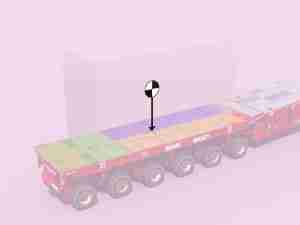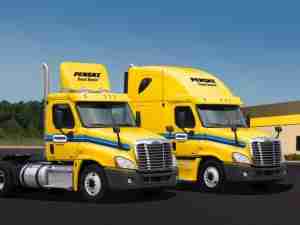Los Angeles, CA – Anheuser-Busch, BYD (Build Your Dreams), the Center for Transportation and the Environment (CTE), and ENGIE Services U.S. (ENGIE) announced that Anheuser-Busch will be deploying 21 BYD battery electric trucks in their California fleet as part of a state project to showcase economically and environmentally sustainable warehousing and distribution technology. This is a landmark achievement as the largest Class 8 electric truck deployment in North America.
‘The Zero Emission Beverage Handling and Distribution at Scale’ project will showcase BYD’s second generation 8TT Class 8 electric trucks at four Anheuser-Busch distribution facilities across southern California: Sylmar, Riverside, Pomona, and Carson.
As part of the project, a southern California-based team from ENGIE will lead the design and installation of charging infrastructure at all four facilities. ENGIE will also be installing and commissioning a 958.5 kW solar array at the Carson site, which will generate zero-emissions power to offset the use of conventional energy in the charging process, further reducing emissions and resource consumption.

“At Anheuser-Busch, we are committed to leading our industry towards a more sustainable future by reducing our carbon emissions across our value chain by 25% by 2025,” said Angie Slaughter, Vice President of Sustainability Procurement at Anheuser-Busch. “The transport industry is one that is prime for innovative solutions and we are excited to continue driving progress towards a zero-emission fleet through this partnership.”
To facilitate the project, the California Air Resources Board (CARB) awarded funds to the Center for Transportation and the Environment (CTE), a leading nonprofit in the zero-emission vehicle industry, who will be responsible for project oversight, development, management, and reporting during this deployment. CTE will also provide technical support, risk analysis and mitigation strategies, permitting, equipment and station deployment, training, and assistance with commissioning.
The project is part of California Climate Investments, a statewide program that puts billions of Cap-and-Trade dollars to work reducing greenhouse gas emissions, strengthening the economy, and improving public health and the environment — particularly in disadvantaged communities. The project is expected to result in emissions reductions of 910 metric tons of CO2 per year, the equivalent of taking almost 200 passenger vehicles off of the road. CARB anticipates the project will be replicated statewide.
“With this exciting project, Anheuser-Busch is providing a real-world demonstration of the future for moving goods and products throughout California,” said Richard Corey, Executive Officer at the California Air Resources Board. “I congratulate all the companies partnering on this impressive effort for embracing zero-emission trucks, and showing other businesses a zero-emissions solution to moving goods and cargo that cleans the air, protects our children’s health, and fights climate change.”
“This project represents a huge step forward in integrating clean energy and clean transportation to realize the full environmental benefits of battery electric vehicles,” said Joel Donham, an Engineering Consultant at CTE. “CTE commends ARB, the CCI program, and all the project partners for their leadership in an effort to demonstrate the viability, benefits, and scalability of holistic energy and transportation systems.”
As part of the initial validation, Anheuser-Busch put the BYD 8TT through extensive testing on range, acceleration, gradeability, charging speed, and more. The truck exceeded the requirements of Anheuser-Busch and received enthusiastic feedback from drivers, clearing the path to this large-scale deployment.
“We’re honored to be part of this major milestone demonstrating the operational, economic, and environmental sustainability benefits of our zero-emission trucks,” said John Gerra, BYD Director of Business Development, Electric Trucks. “BYD trucks are out there right now working hard every day throughout California.”
The project includes equipment testing, a one-year demonstration period, data collection, and associated reporting. CTE anticipates the trucks to begin operation near the end of 2019 with full project completion in early 2021.









